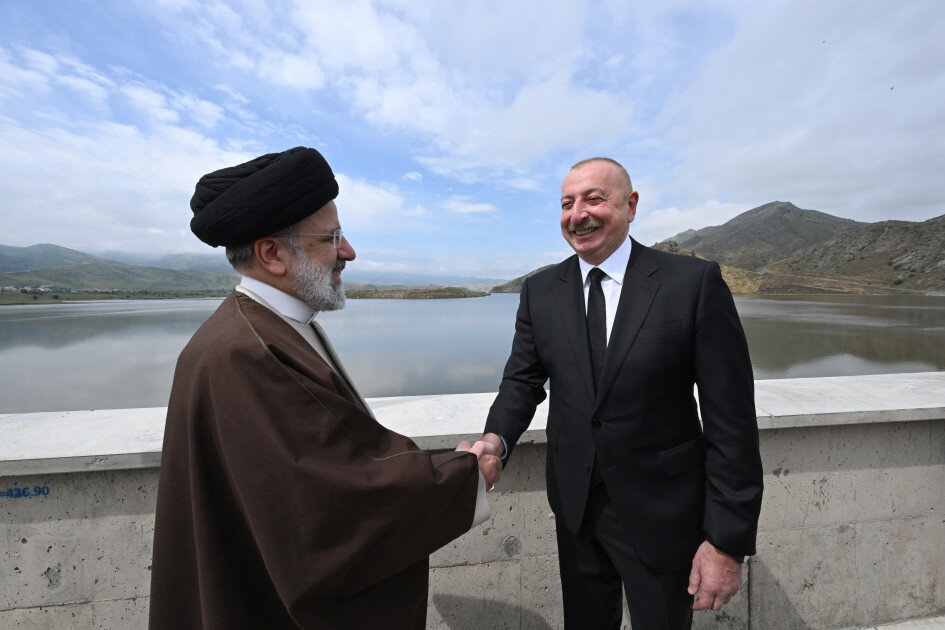Iran-Azerbaijan: ‘unshakable friendship’ beyond borders

TEHRAN – On Sunday, Iranian President Ebrahim Raisi and Azerbaijani President Ilham Aliyev met at the border between their two countries to inaugurate the "Khudafarin" and "Giz Galasi" hydroelectric complexes on the Araz River.
This joint ceremony symbolized a significant step forward in the relationship between Iran and Azerbaijan, highlighting their commitment to cooperation and mutual development.
Addressing the ceremony, President Raisi emphasized the deep-rooted ties between Iran and Azerbaijan. "We, of course, are brotherly, neighboring, and friendly countries. Iran's relationship with Azerbaijan is more than a relationship with a neighbor; it is a kinship," he said. He noted that the bonds between the two nations are based on historical, cultural, and religious ties, which have only strengthened over time.
President Aliyev echoed these sentiments, underscoring the unshakable nature of the Iran-Azerbaijan relationship. "The Iran-Azerbaijan unity and friendship is unshakable. No one can drive a wedge between us," he declared.
“The future development of Iran-Azerbaijan relations is also very positive,” said President Ilham Aliyev as he addressed the ceremony.
Aliyev also highlighted the importance of regional cooperation, urging Armenia to engage constructively in resolving regional issues and contributing to stability rather than relying on distant powers.
“I believe that this is reassuring because it gives hope that finally, after a long break, a peace agreement can be signed between Azerbaijan and Armenia. We welcome Iran's support on this issue,” underlined the Azerbaijani leader.
The meeting and the dam inaugurations mark a turning point following a period of strained relations. Last year, tensions rose after an attack on the Azerbaijani embassy in Tehran, which led to its closure. “Personal and family-related problems” were the attack’s motivation, according to an early Iranian inquiry. Despite this, both nations have shown a remarkable ability to move past these challenges through dialogue and diplomacy.
Just a few days ago, the Republic of Azerbaijan’s foreign ministry spokesperson, Ayhan Hajizadeh, announced that a new location for the country’s embassy in Tehran has been determined.
In mid-March, Abbas Mousavi, Iran's ambassador to Azerbaijan, noted that after attempts by both sides to clear up misconceptions, Tehran and Baku have underlined the need to “open a new chapter” in ties between the two neighbors.
The crisis in the Caucasus also posed significant challenges for both countries, considering the historical and geopolitical complexities of the region. Iran, a key player in the region, has maintained a delicate balance by fostering positive relations with both Azerbaijan and Armenia. Notably, Iran has consistently emphasized its preparedness to assist in resolving disputes and addressing challenges encountered by these neighboring nations.
Furthermore, it is crucial to highlight that Iran has consistently cautioned against external interventions in the Caucasus issue, particularly from actors like Israel. The Iranian government has stressed the importance of regional actors working together to find peaceful solutions through dialogue and diplomacy. Sustainable peace in the Caucasus region, as reiterated by Iran on numerous occasions, can only be achieved through constructive engagement and mutual understanding among all involved parties.
Various external and internal pressures tested the diplomatic resolve of both countries. However, the leadership in Tehran and Baku showed commendable restraint and wisdom by opting for a path of dialogue and reconciliation rather than allowing the situation to escalate further.
The "Khudafarin" and "Giz Galasi" hydroelectric complexes represent the largest joint water project between Iran and Azerbaijan. Located in the Khudafarin region in Iran’s northwestern province of East Azarbaijan, the dams have a combined capacity of regulating 2 billion cubic meters of water annually and are expected to generate 270 megawatt hours of electricity per year. These projects will provide vital water resources for irrigation and energy, significantly benefiting local economies and communities.
Iranian Minister of Energy Ali Akbar Mehrabian described the Giz Galasi dam as a symbol of friendship, constructed according to modern engineering standards. The completion of these projects demonstrates what can be achieved when nations work together towards common goals, setting a precedent for future collaboration.
The ceremony also served as a platform for discussing broader regional issues. President Aliyev noted the ongoing process of defining the borders between Armenia and Azerbaijan, expressing optimism about reaching a peace agreement with the support of neighboring countries, including Iran. He stressed the importance of regional autonomy and independence from external influences.
This renewed partnership between Iran and Azerbaijan sends a strong message about the potential for regional cooperation. The successful collaboration on the hydroelectric projects showcases the benefits of shared interests and mutual support. As both countries continue to strengthen their ties, there is hope for enhanced cooperation in trade, security, and cultural exchanges, contributing to broader regional stability.
In a world often divided by conflict and rivalry, the story of Iran and Azerbaijan’s reconciliation stands as a testament to the power of diplomacy and the potential for peaceful coexistence. The inauguration of the "Khudafarin" and "Giz Galasi" hydroelectric complexes marks the beginning of a new chapter in their bilateral relations, promising a future of cooperation and progress.
The rekindling of Iran-Azerbaijan relations also opens the door for broader regional initiatives. With both countries showing a commitment to peaceful and constructive engagement, there is potential for enhanced cooperation on issues such as trade, security, and cultural exchange.
Leave a Comment